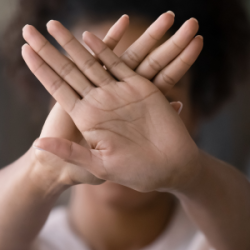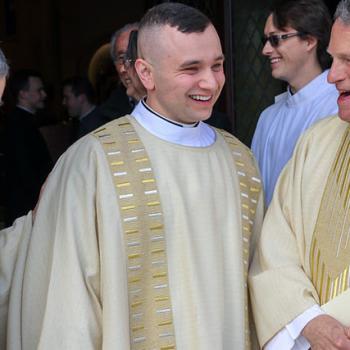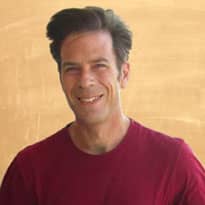"I was flabbergasted," said Japheth, one of his spade-like hands clanking toward his heart. "I told him, 'I came here for Hay-soos, and I hope you'll let Hay-soos into your life, too. We're all called to repentance. Conversion is an ongoing'—"
Impelled by a rogue paternal instinct, I stood up and grabbed him by both shoulders. "Japheth, you're a fine Christian and a fine human being, but you have the common sense of a fly. You can't go around evangelizing to Mexican pimps and drug dealers, not even nice ones ones who depend on gringo goodwill. People get stabbed over that kind of thing."
"The blood of the martyrs is the seed of the Church," Japheth quoted, with no discernable irony. Wanting both to pin a medal on him and lock him in his bedroom, I made him promise to be careful. He promised, but it was clear he didn't know what he was promising. The world for him was a basically friendly place where most people would be happy to hear about Hay-soos. I hoped the Church would put him to work; he had the innocence of a whole coop full of doves.
My tête-à-tête with Japheth turned out to be a good thing. It was a plunge into the deep end of the sanctity and geekiness that put me on edge. Feeling fortified, I sidled up to Melissa, another retreat alumna. Like Japheth's, Melissa's appearance and personality seemed to combine extremes of youth and old age. But she wore her contrasts better than Japheth wore his. Her '80s-style glasses and Marilyn Quayle flip might make her face look, from a distance, like it belonged to a 50-something matron. But rollerblading had given her a body that would have done credit, at any distance, to a college freshman.
"Still thinking about the convent?" I asked, struggling to keep my eyes above her neckline.
"I don't think I'm called to it," she said, frowning slightly. Melissa has the highest voice I've ever heard come from a fully-grown human being. If I were to close my eyes, I'd swear I was talking to a cartoon mouse, or Wendy Testaburger. "I do believe I'm called to parenthood, though. I'm looking into adopting."
I asked whether she thought she might be called to marriage. She shook her head. "I don't think I'm called to have sex. It would be too intense for me to handle. My ideal relationship would be a romantic friendship, like Xena and Gabrielle had."
It's moments like this—when "romantic friendship" sounds like something I'd pay to see videotaped—that I realize what an awful Catholic I really am. Rather than impress my worldly constructs on Melissa's neatly constructed world, I simply nodded.
At that point, we were all called—to table. I found myself seated next to a hearty, sunburned woman named Sister Kristin—yes, I slipped and called her "Sister Christian"—who had just returned from Mexico, where she'd been working on a Habitat for Humanity-type project. "Did you know you can build a house for $150?" she asked me. I told her houses in my neighborhood would be selling for that much before long. The greed and exploitation I saw when I worked in the home finance industry had given me my first real sense of sin, and had made me want, for the first time, to do something with my life besides consume conspicuously. In a sense, they'd gotten me into the Church in the first place, so it was a fitting opening exchange.
After grace, we dug in. My compliments go to the chef, whoever she might have been. These nuns apparently checked their austerity at the dinner table; the turkey was juicier than some grapefruit I've eaten. I was halfway through my second helping—the dears had given me white meat both times—when I noticed that Sister Lucia was missing from her place. Then I saw her friend Henriette, a laywoman and social worker who had scandalized our RCIA class when she lectured us graphically on the dangers of anal intercourse, scurry out of the kitchen, looking worried. I beckoned her over.
When she came, I noticed her listing to one side. Earlier that year, she'd suffered a brain aneurysm and hadn't quite recovered. "Anything wrong with Sister?" I asked.
"She's got a nosebleed," said Henriette, and looked so grim that I realized I was missing something.
"Remember her sister, the one who died suddenly last summer?" I did. Her sister had also been a Sister. When she died, Henriette had e-mailed the whole parish, asking for prayers. "Well, a few weeks before she died, she started getting nosebleeds."
Ever since my father died—suddenly, of an allergic reaction to a bee sting, when he was otherwise healthy as a horse—I've lived in terror of losing the people I love. And that construction is deliberate; with a hoarder's instinct, I dread their death agony less than I do my own sense of loss. "Why doesn't she get herself checked out?" I asked, and realized I was almost shouting.





